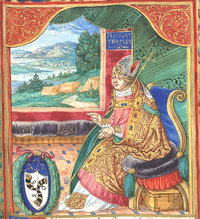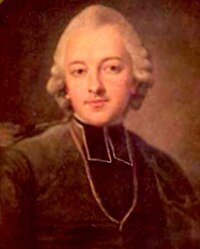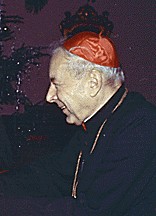Primate Poloniae





Primas Poloniae ( German : Primas von Polen , Polish Prymas Polski ) has been the honorary title of the Archbishop of Gniezno since 1417 to denote his prominent position in the Polish episcopate . The Archbishop of Gniezno is now at the head of the Roman Catholic Church in Poland . As Legatus natus he is the ambassador of the Holy See and represents the authority of the Pope in Poland . Wojciech Polak has held the post since May 17, 2014 .
history
According to the statements of the Polish historian Jan Długosz , a Primate Poloniae was first determined at the Council of Constance in 1417. Since Gniezno ( Gniezno ) was the first capital and first bishopric of Poland, the choice fell on Mikołaj Trąba , the local archbishop. Since then, the title has been borne by all the Archbishops of Gniezno .
He presided over the synods, appointed archdeacons and established the boundaries of the dioceses. In the aristocratic republic of Poland-Lithuania (until 1818) he carried the title of Primate of the Kingdom of Poland and the Grand Duchy of Lithuania (Prymas Królestwa Polskiego i Wielkiego Księstwa Litewskiego).
Since 1515 the office of Archbishop of Gniezno has also been associated with the title Legatus natus . From 1572 to 1795 the Primate Poloniae was also Interrex (Poland) , thus imperial administrator until the election of a new king. He crowned and buried Poland's kings, and administered the sacraments to them and their families . Until 1795 he was the highest senator at the head of the senate of the aristocratic republic . Since 1749 the office was also connected to the cardinal dignity .
Immediately after the Third Partition of Poland in 1795, the Prussian occupiers forbade the use of the title Primate of Poland . But the Holy See ignored the Prussian ban. After the Congress of Vienna had confirmed the division of Poland among its neighbors, in 1818 the Kingdom of Poland, called " Congress Poland ", which was under Russian rule, was granted its own primate. But in 1829 forbade Tsar Nicholas I , who in personal union also king of Poland, was the use of this title.
In the part of Poland belonging to Prussia, the Archbishops of Gniezno, who were also Archbishops of Posen from 1821 to 1946 , kept the title. In 1946 Pope Pius XII. the personal union at the head of the archbishopric Gniezno and Posen and instead merged Gniezno and Warsaw . In 1992, this union was canceled again by the appointment of a new Archbishop of Gniezno. However, the previous Archbishop of Warsaw-Gniezno, Cardinal Józef Glemp , kept the title. At the age of 80 in 2009, Glemp became the first primate to resign in Polish history. Until now, primate dignity had been valid for life. Since then, the title has been granted to the Archbishop of Gniezno again.
Primacy and legation today
In the 20th century, the primate was chairman of the Polish Bishops' Conference by virtue of his office , until the two offices were formally separated in 1994. In fact, this remained meaningless until 2004, as the Bishops' Conference re-elected its previous chairman, Primate Józef Glemp, for two subsequent terms of office. Since March 2004 the chairmanship of the Polish Bishops' Conference has been de jure and de facto independent of the primate dignity. Within the entire episcopate , therefore, the Primate Poloniae are primarily only granted honorary degrees. However, he is a natural member of the Permanent Council of the Bishops' Conference.
Official
Other titles
- 1807–1815: Primate of the Duchy of Warsaw
- 1818–1829, 1925–1938: Primate of the Kingdom of Poland
- 1817–1858: Primate of Our Kingdoms of Galicia and Lodomeria
Web links
Individual evidence
- ↑ The full title was then in Latin: NN Dei et Sedis Apostolicae gratia sanctae Gnesnensis Ecclesiae Archiepiscopus Legatus Natus, Primas Regni Poloniae Magnique Ducatus Lithuaniae Primusque Princeps.
- ↑ Zbigniew Góralski: Urzędy i godności w dawnej Polsce , Warszawa 1998, pp. 62–66
- ↑ Zbigniew Góralski: Urzędy i godności w dawnej Polsce , Warszawa 1998, p. 62.

